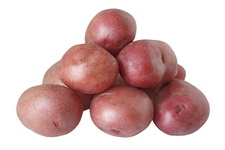
Uganda's First Field Observation of GM Potato Shows Extreme Resistance to Late Blight
January 27, 2016| |
 The first field trial of genetically modified (GM) potatoes resistant to potato blight conducted in Uganda from October 2015 to January 2016 has been completed at the Kachwekano Zonal Agricultural Research and Development Institute (KaZARDI) of the National Agricultural Research Organization (NARO) near Kabale.
The first field trial of genetically modified (GM) potatoes resistant to potato blight conducted in Uganda from October 2015 to January 2016 has been completed at the Kachwekano Zonal Agricultural Research and Development Institute (KaZARDI) of the National Agricultural Research Organization (NARO) near Kabale.
Twelve highly resistant GM potatoes of ‘Desiree' and one of ‘Victoria' varieties from the International Potato Center (CIP) showed extreme levels of resistance compared to the non-GM plants of the same varieties. Using genetic transformation, three resistance (R) genes from wild relatives (Solanum bulbocastanum, and S. venturii) were transferred into farmers' preferred varieties and the results are encouraging. A number of partially resistant varieties exist, but these are not preferred by farmers and consumers. This first observation of zero-fungicide potatoes marks an important milestone in the development and future deployment of biotech potato varieties to farmers in Africa that will significantly reduce losses and cost of production.
In Uganda, losses due to potato late blight can reach up to 60%, forcing farmers to spray fungicides up to 15 times to protect their crops. About 300,000 smallholder households grow potatoes for their subsistence living and income generation. Losses due to late blight represents between 10-25% of their revenue from potato.
For more details about this project, contact Dr. Andrew Kiggundu/NARO (akiggundu@kari.go.ug), or Dr. Marc Ghislain/CIP (m.ghislain@cgiar.org).
| |
Biotech Updates is a weekly newsletter of ISAAA, a not-for-profit organization. It is distributed for free to over 22,000 subscribers worldwide to inform them about the key developments in biosciences, especially in biotechnology. Your support will help us in our mission to feed the world with knowledge. You can help by donating as little as $10.
-
See more articles:
-
News from Around the World
- Globe Artichoke Genome Sequenced
- Uganda's First Field Observation of GM Potato Shows Extreme Resistance to Late Blight
- Genomes of Grafted Plants Communicate with Each Other
- Scientists Discover Pathways for Pest Resistance
- FSANZ Invites Comments on GM Corn Line Application
- GM Camelina Could Replace Fish Oil as Primary Source of Fatty Acids
- Plant-based Enzyme for the EU Industry
-
Research Highlights
- TaRLK Genes Confer Powdery Mildew Resistance in Common Wheat
- Downregulation of OsSPX1 Causes Semi-Male Sterility and Grain Yield Reduction in Rice
- Overexpression of Yeast Transcription Factor Improves Root Architecture in Black Locust
-
Beyond Crop Biotech
- Rice as a Platform for the Production of Microbicide Against HIV
- GM Mosquitoes to Fight Zika Virus in Brazil
-
From the BICs
- Students and Lecturers in Indonesia Join National Biotech Seminar 2016
-
Announcements
- FAO International Symposium on Agricultural Biotechnologies
- 2nd Microbiome R&D and Business Collaboration Congress: Asia
-
Read the latest: - Biotech Updates (December 17, 2025)
- Gene Editing Supplement (December 17, 2025)
- Gene Drive Supplement (February 22, 2023)
-
Subscribe to BU: - Share
- Tweet
